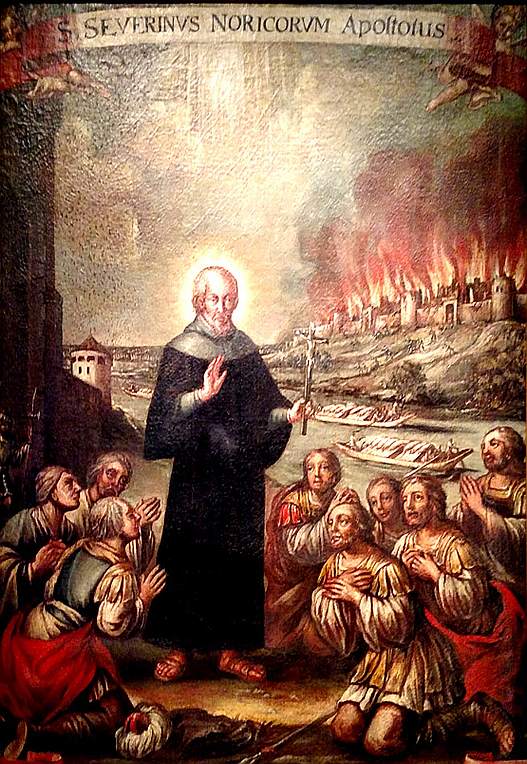Adapted from Various Sources.
St. Severinus, Abbot and Apostle of Austria († 482; Feast – January 8)
 We know nothing of the birth or country of this Saint. From the purity of his Latin, he was generally supposed to be a
Roman; and his care to conceal what he was according to the world, was taken for a proof of his humility, and a presumption that he was
a person of noble birth. St. Severinus spent the first part of his life in the deserts of the East; but inflamed with an ardent zeal
for the glory of God, he left his retreat to preach the Gospel in the North – specifically, the Roman territory of Noricum,
which corresponds chiefly to modern-day Austria.
We know nothing of the birth or country of this Saint. From the purity of his Latin, he was generally supposed to be a
Roman; and his care to conceal what he was according to the world, was taken for a proof of his humility, and a presumption that he was
a person of noble birth. St. Severinus spent the first part of his life in the deserts of the East; but inflamed with an ardent zeal
for the glory of God, he left his retreat to preach the Gospel in the North – specifically, the Roman territory of Noricum,
which corresponds chiefly to modern-day Austria.
At first he came to Asturis, now Stockerau, situated north of Vienna; but finding the people hardened by vice,
he foretold the punishment God had prepared for them, and repaired to Carnuntum, near what is now known as Hainburg an der Donau
(on the Danube river – about 25 miles east of Vienna and ten miles west of the border with Slovakia). It was not long before
his prophecy was verified; for Asturis was laid waste, and the inhabitants destroyed by the sword of the Huns, soon after the death of
Attila. By the accomplishment of this prophecy, and by several miracles he wrought, the name of the Saint became famous.
Favianis (now Mautern an der Donau), a city on the Danube twenty leagues from Vienna, distressed by a terrible
famine, implored his assistance. Saint Severinus preached penance among them with great fruit, and he so effectually threatened with
divine vengeance a certain rich woman, who had hoarded up a great quantity of provisions, that she distributed all her stores amongst
the poor. Soon after his arrival, the ice of the Danube and the Inn broke up, and the country was abundantly supplied by barges
coming up these rivers. Another time by his prayers he chased away the locusts, which by their swarms had threatened with devastation
the whole produce of the year. He wrought many miracles; yet never healed the sore eyes of Bonosus, the dearest to him of his disciples,
who spent forty years in almost continual prayer, without any abatement of his fervor. The holy man never ceased to exhort all to
repentance and piety; he redeemed captives, relieved the oppressed, was a father to the poor, cured the sick, mitigated, or averted
public calamities, and brought a blessing wherever he came. Many cities desired him for their bishop, but he withstood their
importunities by urging that it was sufficient he had relinquished his dear solitude for their instruction and comfort.
 He established many monasteries, of which the most considerable was one on the banks of the Danube, near Vienna;
but he made none of these his constant abode, often shutting himself up in a hermitage where he devoted himself wholly to contemplation.
He never ate till after sunset, except on great festivals. In Lent he ate only once a week. His bed was sackcloth spread on the floor
in his oratory. He always walked barefoot, even when the Danube was frozen. Many kings and princes of the Barbarians came to visit him,
and among them Odoacer, King of the Heruli, then on his march to Italy. The Saint's cell was so low that Odoacer could not stand upright
in it. St. Severinus told him that the kingdom he was going to conquer would shortly be his; and Odoacer, seeing himself soon after the
master of Italy, sent honorable letters to the Saint, promising all he was pleased to ask; but St. Severinus only desired of him the
restoration of a certain banished man.
He established many monasteries, of which the most considerable was one on the banks of the Danube, near Vienna;
but he made none of these his constant abode, often shutting himself up in a hermitage where he devoted himself wholly to contemplation.
He never ate till after sunset, except on great festivals. In Lent he ate only once a week. His bed was sackcloth spread on the floor
in his oratory. He always walked barefoot, even when the Danube was frozen. Many kings and princes of the Barbarians came to visit him,
and among them Odoacer, King of the Heruli, then on his march to Italy. The Saint's cell was so low that Odoacer could not stand upright
in it. St. Severinus told him that the kingdom he was going to conquer would shortly be his; and Odoacer, seeing himself soon after the
master of Italy, sent honorable letters to the Saint, promising all he was pleased to ask; but St. Severinus only desired of him the
restoration of a certain banished man.
Having foretold his own death long before it happened, he fell ill of pleurisy on the 5th of January, and on the fourth
day of his illness, having received Viaticum, and arming his whole body with the Sign of the Cross, he repeated that verse of the
Psalmist: Let every spirit bless the Lord (Ps. 150), closed his eyes and expired on the 8th of January, 482. Six years after,
his disciples, obliged by the incursion of the Barbarians, retired with his relics into Italy, and deposited them at Castellum Luculanum
(now Castel dell'Ovo), near Naples, where a great monastery was built, of which Eugippius, his disciple and author of his life,
was soon after made the second Abbot. In the year 910 the relics were translated to Naples, where they were honored in a Benedictine
abbey, which bears his name (along with St. Sossius, companion in martyrdom to St. Januarius, whose relics were also translated to
this abbey).
A perfect spirit of sincere humility is the spirit of the most sublime and heroic degree of Christian virtue and perfection.
As the great work of the sanctification of our souls is to be begun by humility, so must it be completed by the same. Humility invited
the Holy Ghost into the soul, and prepares her to receive His graces. From the most perfect charity, which He infuses, she derives a new
interior light, and an experimental knowledge of God and herself, with an infused humility far clearer in the light of the understanding,
in which she sees God's infinite greatness, and her own total insufficiency, baseness, and nothingness, in quite a new manner.
In this light she conceives a relish of contempt and humiliations as her due, feels a secret sentiment of joy in suffering them,
sincerely loves her own abjection, dependence, and correction, dreads the esteem and praises of others, as snares by which a mortal
poison may imperceptibly insinuate itself into her affections, and deprive her of divine grace. She is so far from preferring herself
to anyone, that she always places herself below all creatures, is almost sunk in the deep abyss of her own nothingness, never speaks of
herself to her own advantage, or affects a show of modesty in order to appear humble before men; in all good, gives the entire glory to
God alone, and as to herself, glories only in her infirmities, pleasing herself in her own weakness and nothingness, rejoicing that God
is the great All in her and in all creatures.
Back to "In this Issue"
Back to Top
Back to Saints
NEW: Alphabetical Index
Contact us: smr@salvemariaregina.info
Visit also: www.marienfried.com


 We know nothing of the birth or country of this Saint. From the purity of his Latin, he was generally supposed to be a
Roman; and his care to conceal what he was according to the world, was taken for a proof of his humility, and a presumption that he was
a person of noble birth. St. Severinus spent the first part of his life in the deserts of the East; but inflamed with an ardent zeal
for the glory of God, he left his retreat to preach the Gospel in the North – specifically, the Roman territory of Noricum,
which corresponds chiefly to modern-day Austria.
We know nothing of the birth or country of this Saint. From the purity of his Latin, he was generally supposed to be a
Roman; and his care to conceal what he was according to the world, was taken for a proof of his humility, and a presumption that he was
a person of noble birth. St. Severinus spent the first part of his life in the deserts of the East; but inflamed with an ardent zeal
for the glory of God, he left his retreat to preach the Gospel in the North – specifically, the Roman territory of Noricum,
which corresponds chiefly to modern-day Austria. He established many monasteries, of which the most considerable was one on the banks of the Danube, near Vienna;
but he made none of these his constant abode, often shutting himself up in a hermitage where he devoted himself wholly to contemplation.
He never ate till after sunset, except on great festivals. In Lent he ate only once a week. His bed was sackcloth spread on the floor
in his oratory. He always walked barefoot, even when the Danube was frozen. Many kings and princes of the Barbarians came to visit him,
and among them Odoacer, King of the Heruli, then on his march to Italy. The Saint's cell was so low that Odoacer could not stand upright
in it. St. Severinus told him that the kingdom he was going to conquer would shortly be his; and Odoacer, seeing himself soon after the
master of Italy, sent honorable letters to the Saint, promising all he was pleased to ask; but St. Severinus only desired of him the
restoration of a certain banished man.
He established many monasteries, of which the most considerable was one on the banks of the Danube, near Vienna;
but he made none of these his constant abode, often shutting himself up in a hermitage where he devoted himself wholly to contemplation.
He never ate till after sunset, except on great festivals. In Lent he ate only once a week. His bed was sackcloth spread on the floor
in his oratory. He always walked barefoot, even when the Danube was frozen. Many kings and princes of the Barbarians came to visit him,
and among them Odoacer, King of the Heruli, then on his march to Italy. The Saint's cell was so low that Odoacer could not stand upright
in it. St. Severinus told him that the kingdom he was going to conquer would shortly be his; and Odoacer, seeing himself soon after the
master of Italy, sent honorable letters to the Saint, promising all he was pleased to ask; but St. Severinus only desired of him the
restoration of a certain banished man.